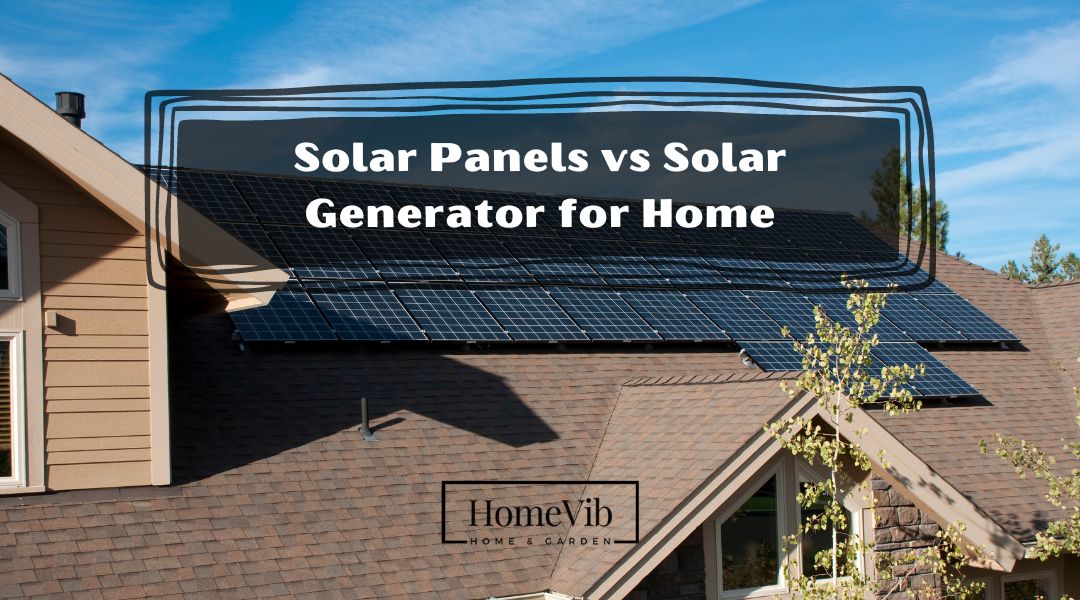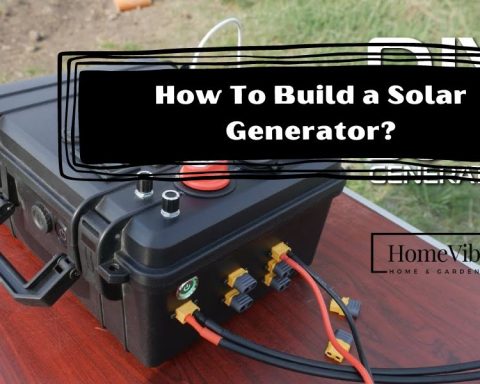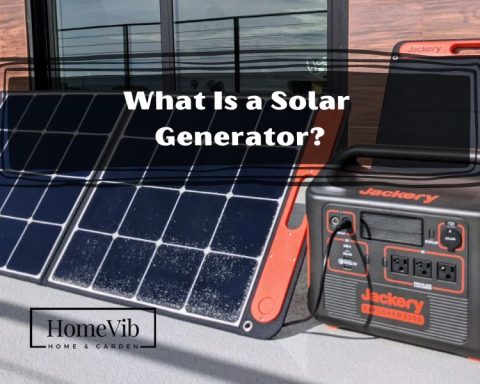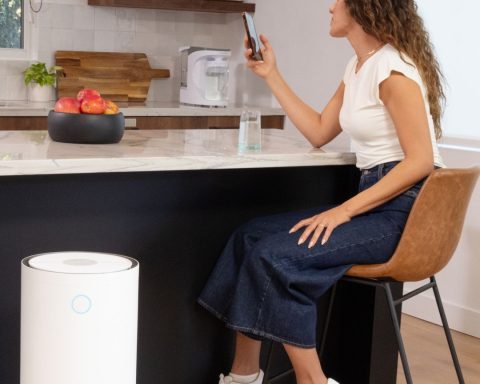Let’s be honest. We can’t leave the house without our phones, tablets, laptops, air conditioners, and possibly even a coffee machine. So we want a dependable power solution to keep everything operating when needed with all of these amenities.
If you’re new to solar energy, you may wonder where to begin. First, you’ll have to choose between various panels, batteries, and other components and whether to go with a solar generator or a full-fledged solar system.
Solar Panels provide electricity from the sun. Solar panels are the way to go if you want to use the sun to power your home. However, they’re usually more expensive than solar generators.
On the other hand, a Solar Generator is an easy solution for keeping your appliances running without worrying about storing batteries or paying for fuel. Of course, generators require access to an outside power source, but they’re still great options for people who don’t want to deal with messy batteries or maintenance issues.
This article will go over the main differences between Solar Panels and Solar Generators and some things to consider when deciding which is better for your home.
Solar Generators Vs. Solar Panels: What’s The Difference?
Solar Generators and Solar Panels are different from one another. But because they both come from the field of solar energy, many people are confused about how they work.
These are two of the most popular ways to produce electricity from sunlight, but what is the difference?
What is a Solar Generator?

The Solar generator’s primary purpose is to provide backup power in an electrical outage. Therefore, these types of equipment are commonly used as backup power systems.
Most generators take part in liquid propane, natural gas, or diesel. Outside the home, freestanding generators can be triggered manually or by sensors. Outages are detected by inbuilt sensors, which turn on the generator automatically.
During power shortages, generators are less expensive than solar battery backup. While their inexpensive initial cost, generators require frequent maintenance and frequently have minimal recurrent costs. For example, working during outages requires weekly self-tests and continual recharging.
What is a Solar Panel?

Solar Energy is produced by the sun. Solar panels (also known as “PV panels“) convert sunlight’s light, which is composed of energy particles known as “photons,” into electricity that can be used to power electrical loads.
These panels can be used for various purposes, including remote power systems for cabins, telecommunications equipment, remote sensing, and electricity generation by residential and commercial solar electric systems.
Additionally, they convert pure renewable energy in sunlight into electricity, which may then be used to power loads. Solar panels comprise numerous individual solar cells comprised of layers of silicon, phosphorous (which produces light), and other elements.
What is the Difference?
Solar panels are flat, usually rectangular-shaped devices made of photovoltaic cells. These cells are semiconductors that react to sunlight and generate an electric current. They can be mounted on rooftops or freestanding structures or put into arrays (groups) in fields or other areas with plenty of sunlight and space.
Solar generators are similar to a battery backup system: they store energy from the sun during the day to be used at night or during cloudy periods. They have a battery and an inverter built into them so that you can plug your appliances into them directly.
Solar Panels vs. Solar Generators for Home
If you’re planning on installing solar panels in your house or business, you might wonder whether or not to invest in a solar generator.
While both options have unique pros and cons, you might ask which is better for your home.
Usage
Solar Panels
- Require more permanent installations, even if the panels themselves are portable.
- Connecting it to your home’s electrical system, RV, or watercraft is recommended.
- The system is always operational, even when moving, and will supply more power per the same size panels.
- It can only be used to supplement existing electricity sources
Solar Generators
- Often portable, as they may be stored and brought out as needed.
- You can take your generator with you wherever you go, making it an excellent choice if you need solar power for various portable applications.
- Provide a continuous electricity supply, using a built-in battery and a generator to produce electricity
Battery Capacity

Solar Panels
- It uses solar batteries, which are helpful to households that reside in areas prone to power outages.
- Have access to energy storage incentives or do not have full retail net metering.
- Batteries are called Lithium-ion, which have become an increasingly popular choice for solar systems worldwide.
- Requires one charge cycle for storage of battery lifespan
Solar Generators
- These devices are better at storing energy than traditional solar panels, which can only be used to recharge batteries.
- The battery capacity of solar generators is typically much smaller than those found in traditional generators.
- These devices have shorter run times than their counterparts and won’t last as long when not connected to an outlet or an external battery pack/charger.
- Solar generators do not require you to use all the energy they produce.
- Built-in battery capacity is often limited, and the ability is not extensible in most cases.
- Unable to store considerable amounts of electricity for usage during the night.
Investment
Solar Panels
- Cost roughly $16,000 on average, or between $3,500 to $35,000 depending on the style and model.
- It is more expensive to purchase because it comprises several components that must be assembled and installed on your roof.
- Solar panels will be worth it in the long run.
- You shall be able to save money on electricity bills and generate enough power to run your household appliances home.
Solar Generators
- A small unit may cost around $500, while larger ones can cost as much as $10,000 or more, depending on their size and features.
- It can be purchased as a single unit and plugged into an outlet in your home.
- Tend to be cheaper than traditional solar panels
Recharging

Solar Panels
- Profit from their permanent installation
- Receive power without your intervention; backup power should be available when you need it as long as your system is operating correctly.
- If covered with snow or rain during the winter, it will slow their ability to produce electricity.
Solar Generators
- Store electricity, so they don’t need recharging
- Only recharge when they are exposed to sunlight; therefore, you must remember to leave them there to recharge.
- Charging the internal battery may be a lengthy procedure. When the system is turned off for travel, no power is created.
- They are often used as an emergency power source when no electricity is available in your home or area.
- It does not need to be plugged into the grid like a traditional solar panel.
Maintenance
Solar Panels
- Require examination, mainly to keep them clean and to check that there are no fractures or other concerns that could jeopardize their functionality
- It requires more maintenance and is more challenging to inspect and maintain, especially those permanently attached.
- Portable solar panels that link to a whole system could be an alternative
- Long-term savings are substantial
- Will last for decades
Solar Generators
- Easy to maintain if they’re kept indoors away from moisture and dust particles
- The simplicity of maintenance is because they may be moved as needed.
- They require fuel that can be expensive and difficult to obtain
- Purchasing a solar generator can be prohibitively high if you’re looking for one with significant wattage.
- It will only last for a few years before you need to replace it with another one.
What Are the Pros And Cons Of a Solar Generator?
Pros
- Rapid Charging – charges the battery significantly faster than solar while also managing the charge.
- Directly Run Appliances – A generator can power devices without charging the battery, generating vast amounts of electricity.
- Electricity Conversion – is the most practical use for powering high-wattage appliances.
- User-friendly – silent, no noise when in use
- Flexible – It is not weather dependent
Cons
- Fuel – consumes fuel implies that in addition to the ongoing cost of running a generator, you must also ensure that you have enough energy.
- Emissions, Noise, And Constraints – Generators, unlike solar panels, can be noisy. The model determines how loud it is
- Restricted – Many national parks and public locations prohibit generators or establish tight time limits on when they can be used.
- Hefty and clumsy – heavier, with models weighing between 13 and 30kg before fuel. They are also larger and take up more space in your caravan.
What Are the Pros And Cons Of Solar Panels?
Pros
- Battery Backup Systems – wholly silent and boost the daily solar consumption of your home.
- Renewable Energy– eliminating the need to spend money on polluting, expensive fuels.
- Clean Power – the essential advantage of solar panels. They make no noise, emit no gases, and are environmentally beneficial.
- Free Power – completely free to use. There is no need to purchase fuel to keep solar panels working. The energy of the sun is free. So, after you’ve purchased the equipment, you won’t have to pay a dime.
Cons
- Longer Hours For Charging – It takes longer than a generator to charge your batteries.
- Limited Number of Panels – the amount of electricity generated by a solar system is limited by the number and size of panels that may be installed on your roof.
- No Power Due To Bad Weather – unable to charge your batteries if there is a period of severe weather and no sun. No power = no charge.
- Initial Setup Fees – can cost more to install than generators. Solar panels only charge a battery, whereas a generator may power your appliances directly.
- Batteries – solar maintenance on the regulator is required to safely regulate your batteries’ charge. You’ll also need a longer cable.
Solar Panels vs. Solar Generator for Home: Which One Is Better?

Which wins now that you’ve seen the substantial distinctions between solar generators and systems?
Purchase A Standby Backup Generator
A standby backup generator is an excellent choice if you need emergency power and have no plans to install solar panels. Installing a standby generator may be simple if your home already has a natural gas hookup.
Purchase Solar Battery Backup
Customers who want a backup system that can work with any existing or future solar energy system should consider solar battery backup. A battery system is ideal for people who want a low-maintenance, dependable, and environmentally responsible alternative.
The true answer here is that it is dependent on your application. Solar generators have a niche in portable power applications and low-use applications. However, a built-in solar system will outperform a solar generator for most applications and customers.
Using a solar generator in an RV or home works well for short-term backup applications but is less tempting for long-term use. Solar systems are constantly ready, so you can always connect to electricity and prepare for a power outage.
Unlike other generators with limited battery capacity, solar systems can be expanded to store as much energy as you like. As a result, it’s ideal for meeting the power requirements of heavy users.
While they may be less expensive, the extra money for full-fledged solar systems is well worth it. And, because of federal tax credits and other incentives, the arrangement may be more affordable than you think.
Furthermore, well-maintained solar systems can last two decades or more, whereas your generator’s life will undoubtedly be shorter.
People Also Ask
Can a house run on solar power alone?
Unfortunately, current technology does not allow the average homeowner to go completely “off-grid” using only solar panels. However, this does not rule out the possibility of installing them. The power produced by a solar panel is determined by two primary factors: its efficiency rating and its various components.
How many solar panels would it take to power a house?
To cover 100 percent of an average home’s electricity consumption, 20 to 25 solar panels are required. Your geographic location, panel efficiency, panel-rated power, and personal energy usage habits determine the quantity you’ll need to install.
Is solar power a waste of money?
Solar energy is less expensive than “standard” electricity. Installing new solar panels is cheaper than an equal investment in coal, natural gas, or other fossil fuel options.
Do solar panels ruin your roof?
Solar panels do not harm your roof and may raise the value of your home. For example, homes with solar panels might sell for 4% more than homes without them.








